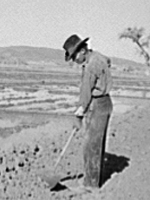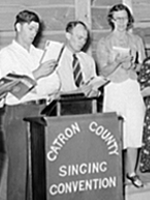
Pounds, Lonnie Courtney "Buck"About | Story: His Field Overflows with Water | Abstract AboutCovers consultant's life as a farmer, grocery store owner, butcher, and horse trader.
Story: His Field Overflows with Water
Marcie Palmer: Did equipment change a lot in those years? Lonnie Pounds: Oh my goodness yes. When I bought this farm out in Hagerman, I got two teams, some big old gray mares, good mares, and one little Case tractor. And done a lot a things with that one little old tractor. The first head of water that I ever turned loose in my life, I knew nothin' in the world about irrigatin'. This farm that I had at that time had a big reservoir, and we pumped our own water. And I had this field of onions an' turned that, bedded up and those onions set in dry dirt. I had a black man workin' for me, and vee'd us a ditch there, you know, and turned on a big head of water, and he'd just back up there and laugh at me, 'cause I 'as doin' it so wrong, you know. Why, we couldn't no more held that water than nothin' in the world. We had five times too much water turned loose. I thought that water would get to Hagerman before we got it cut off. Finally, he says, "You want me to go cut it off?" And, why, say, it's the thing to do, but I didn't know it. I'd come from Lamesa[, Tex.,] in there an' nobody told me anything about that. I just got after it, now and then, be two different things. MP: So you were a dry-land farmer, and you had some irrigation down there, and you didn't know how to handle it. LP: Right. MP: You had irrigation ditches that ran along the sides. Then you didn't know that you had to send 'em down each row or ... LP: And I didn't know what had to be done and that big water, it was looking for lower ground. And it found it. But then when I found out, turned loose just what little water I could handle, got strung out there with my tubes, and, say, that water's the best teacher I ever had. Got it under control. I believe I had as much bad luck right here in this valley as a person could have. Then when I got up here and went back into the cultivatin' and all, it wasn't easy but finally get a new hold on life, but the main thing that pulled me out after I got back into this was the horses. They stayed with me, and I stayed with them. Abstract
Tape 1, Side A
Mr. Pounds was born on August 10, 1910, in Rule, Texas, to Eddie and Annie Lane Pounds. He was given his nickname because at a young age he was bald-headed and fat, just like a local bartender called Buck. Mr. Pounds had a variety of occupations, including farming, running a grocery store, and trading horses. With the help of his wife, Mary, the consultant provided the names and birth dates of his two brothers and four sisters. Mr. Pounds got married in 1932 and had two children. He provided the names and birth dates of his children, grandchildren and great-grandchildren. The consultant's father was a farmer, and at various times the family lived in Rule, Haskell, Knox City, Ford City, and Lamesa, Texas. Whenever his father was unable to go into the fields he would swap stock, giving Mr. Pounds a background in the horse-trading business. When he grew up, Mr. Pounds farmed in Roswell and then Hagerman for a time. He also owned a grocery store while he was farming. In 1939 he moved to Roswell and worked at the Parkway store. He also had a farm between Dexter and Hagerman before selling out and moving to Artesia. Then in 1941 or 1942 he sold his farm and bought another grocery store in Artesia with a partner named Nelson. They ran the store in Artesia under the name Nelson Pounds for about six years.
Tape 1, Side B
Eventually the Parkway store went broke, and Mr. Pounds moved back to Artesia, where he worked in a grocery store for Warren Batie. It was a small store with a dirt floor. Eventually they moved into a grocery store in the Carper building. Finally he went into the grocery business for himself for four or six years, then bought a farm southeast of Artesia. After he sold that farm he went into the horse business, where he stayed until he was forced to retire due to health reasons. The consultant states he didn't train horses, but just bought and sold him. His favorite horse was one he bought in the morning and sold that same afternoon. He described himself as a good hand at riding and swapping horses, but did not consider himself a good roper or trainer. His main love was always trading things. Mr. Pounds relates the first car his family bought, in 1926. His father wanted to pay a drug bill he owed, but had his oldest son drive the car because he did not want the druggist seeing him driving a new car when he owed him money (probably less than ten dollars, Mr. Pounds believes). His family always had a vegetable garden, and his mother canned everything she could, including plums growing wild in the area. He also describes pie melons, which his mother made into preserves or pickled. She also cooked cashaws, which he describes as a longneck pumpkin which tasted somewhat like sweet potatoes. His father grew corn, milo and cotton, raised Cornish game hens, and the boys gathered mesquite, which they would haul the fourteen miles into Crowell and sell it to the cafés there. He missed a lot of school in order to help out on the farm, and a few weeks into the eighth grade his schooling was ended so he could help get the crops in.
Tape 2, Side A
Mr. Pounds described his grocery store, which he owned with Cloyce Nelson during World War II. Mr. Nelson was a "tip-top" butcher. Many times people would drive up from Carlsbad or Hobbs just to get some fat out of a sow's belly. He could legally butcher five cows and five hogs a day if he could get them. Many nights he butchered all night and took the fresh-butchered meat into the grocery store for that day. The customers had to have ration stamps to buy things like meat and sugar. Mr. Pounds needed stamps to buy meat, but he didn't need stamps for the animals he butchered at night. He made the most money from the animals he butchered at night. (It's not totally clear if he collected ration stamps when he sold the meat from these animals.) Mr. Pounds talked about the changes in equipment. When he farmed in Hagerman he had two teams of gray mares. Then he got a little Case tractor. Because he had been a dry land farmer, he knew nothing about irrigation and tells how he learned to handle water. He also learned the hard way how hail can damage crops. He had problems growing cotton; he could "raise a big stalk, but not much cotton." This, plus a lot of bad luck, made him determined to go into the horse-trading business, a business he stayed in until his health deteriorated. The consultant also describes his religious conversion in the mid-1950s. Religion had not been an important part of his family's life when he was a child.
Tape 2, Side B
The consultant stated again how much he loved to ride and trade horses and traveled the western states buying and selling horses. In later years he would take off from December to April and spend time In Lajitas, Texas, or in Arizona. When asked what he considers unique about rural life he answered that it is living and trading with people of his class. His advice to traders is to be as honest as possible. As far as the future of farming goes, farm machinery is so expensive that the small farmer will need something to supplement his income. As far as horse-trading goes, he feels that as long as there are people, there will be good horses and they are here to stay. Therefore, he feels the future of horses is better than it has been, particularly if people work to improve them. (Buck Pounds died on September 22, 2000.) |

